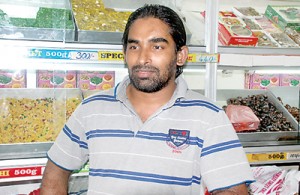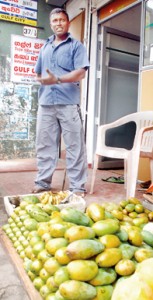News
Budget and the burden: People say “We want relief”
With the budget just 10 days away, expectations of the people are high that measures will be put in place to reduce the spiraling cost of living.
In recent months, prices of several commodities and imported items have gone up, with the latest being Friday night’s flour price increase which is set to push up the prices of bread and other flour-based products.

Hifaal Mohommad, manager of a sweet shop
Fuel, LP gas, milk powder, bread and canned fish prices went up earlier along with transport fares, electricity and water tariffs. A cross section of the public interviewed by the Sunday Times expressed their views on their expectations from the budget.
“We find it hard to live with this high cost of living. The only thing we expect from the government is a reduction in the prices of essential commodities,” said N. K. Jagath, a lottery seller from Angoda.
He said he found it hard to feed his 18-month-old daughter after the increase in milk powder prices while his lottery sales had also seen a drop after the authorities raised the price of a lottery ticket from Rs. 10 to Rs. 20.
Echoing similar views, R. A. Abeysiri, a three-wheeler driver from Borella, said he was compelled to take loans from various people to cope with the rising cost of living.
“Nowadays not many people go in three wheelers because they can’t afford it. What we expect from the budget is a fuel price reduction which will help us to earn a decent living,” he said. W. Jayasekara who runs a salon in Borella said the government should bring down the prices of essential items without burdening the people with unnecessary taxes.
Hifaal Mohommad, manager of a sweet shop in Maradana, asked how he could sell his products when people did not have enough money to spend for basic needs.
Lasantha Wijesinghe, owner of a nearby textile shop, also shared his views. He said the people had resigned to their fate because they knew they would get hardly any relief from the budget.

Sandun Priyadarshana, a fruit seller. Pix by M.D. Nissanka
Sandun Priyadarshana, a fruit seller from Matara, said the root cause for the price increase was the rise in fuel prices. If the government could bring down the fuel prices, the prices of many commodities would come down.
Housewife W. A. Yamuna, a mother of a young child, said her family’s expenditure kept rising while the income remained the same.
Pettah fish monger Rohana Kumara said the Government should provide some relief to meet the cost of living. He said that he had taken loans to sustain his business and only a meagre amount remained in his hands after he paid the interests.
“I have two children and I dread to think their future because we have no other incomes; this is the plight of every common man,” he said.
Meat seller Mohammad Rizvi said his customers who used to buy one kilo of meat now bought half a kilo. “This is my only source of income from which I can earn a daily living of about 700 rupees. I have three children and what can you do with 700 rupees? When I buy breakfast for the family, half of it is over and I am in debt because what I earn is not enough to support my family,” he said.
He said that government workers aren’t burdened by the present cost of living. “If a government servant works or not he gets paid at the end of the month, but for us no work means no money,” he said.
But government servant Rohan Abeypala, a station master, said it was the same for government servants because their salaries were not enough to run a family.
“The Government should give substantial salary increments or reduce prices,” he said.
| Big hopes, but questions remain |
| Traders, trade union leaders, community activists and service providers said they want urgent relief but a big question remains whether the Government could provide it.
Private Bus Owners Association President Gamunu Wijerathne charged that the Government had done little or nothing to restore the struggling transport sector to its former glory. “Nothing has been done in the previous budgets and we don’t expect anything from the upcoming budget either. The government claims that it has allocated money for the National Transport Commission. We don’t know where this money has gone. We can’t do anything but expect the gradual decline of the industry,” he said. Colombo Traders Association President Palaniyandi Sundaram said the Government had increased the duty on the imported food items to help local farmers to sell their products. But this had not helped the consumer because the prices of local products were also high. On the other hand, traders are suffering sales drop because of the high cost of imports. Colombo Housewives Association Secretary Diyana Rizvi said housewives were complaining about food prices and were expecting a price reduction in at least basic food items such as dhal, rice and milk. Now that the war had come to an end, the Government could afford to spend the money spent on defence to provide relief to the people, she said. Estate Workers Association President F. Ramanadan said they had submitted a proposal to the government seeking relief for the daily paid estate workers especially when there was no work in estates due to droughts, floods or other natural disasters. Sri Lanka Bakery Owners Association President N. K. Jayawardena said: “We are also citizens of this country just like the farmers. With the increase of flour and other bakery items, the industry is struggling to survive. We hope the government would remove the National Building Tax on bread sales and the VAT on other bakery products.” S. Thavarthnam, President of the Northern Province Fisherman Alliance, said the fishermen of the Northern Province suffered heavily during the war but very little was done to lift their living standards in the post-war budgets. The Government should provide the northern fishermen some relief at least in the upcoming budget. |
| Prices up, up and away |
| This year prices of essential commodities such as LP gas, milk powder, wheat flour, bread, fuel and cement were increased. Adding more burdens upon consumers, rates of essential services such as water and electricity were also increased. Bus operators also increased their fares.
The most recent hikes were Friday’s increase in the price of wheat flour. It came a week after chicken and cement were also increased. The price of chicken was increased by 30 rupees and a kilo of chicken now costs around 380 rupees in retail markets. After the increase in cement prices in May this year, there was another increase this month with the price of a 50 kg bag of cement being increased by 68 to 85 rupees. The current retail price of a 50 kg bag of cement is around 925 rupees. With the increase of import duty in June, the prices of a number of consumer goods also went up making it harder for consumers to make the ends meet. Sugar went by by 10 rupees a kilo, potato by 30 rupees a kilo, Garlic by 40 rupees a kilo, canned fish by 85 rupees a kilo, Maldive fish by 250 rupees a kilo and dried fish by 100 rupees a kilo. For garlic, sugar and dhal, the increase in the import duty was the second this year following the increase in January. In May there was an increase in the prices of LP gas and milk powder.With effect from May 04, the price of a 12.5 kg domestic LP gas cylinder, both Litro and Laugfs, was increased by 350 rupees. The price of a 400 g packet of imported milk powder went up by 61 rupees and the price of a 1 kg packet of milk powder was increased by 161 rupees. In April, the prices of wheat flour increased by Rs. 8.50 and the new price was Rs. 97.50 a kilo. As a result of fuel price hikes, the prices of bus fares were also increased. The National Water Supply and Drainage Board increased water tariffs by 20% per unit and with the addition of the Fuel Adjustment Charge (FAC) by the Ceylon Electricity board, electricity rates also went up. |
| Puttalam people say they too are going through hardships |
| By Hiran Priyankara
The common perception among Colombo residents is that the cost of living is only an urban problem and it is not a main issue for the rural people. The Sunday Times interviews a cross section of the people in the Puttalam district to find out their views on the budget. S. P. Piyadasa (75), a coconut cultivator in Anamaduwa, said that as a result of the drought in the Puttalam area, cultivators are facing many hardships. “More than 300,000 coconut trees were destroyed and the government had promised to give a coconut tree to each of those destroyed but what can an old man like me do with that? What we ask the government is relief in the upcoming budget,” he said. Sixty-four-year-old J.A. Somapala, a farmer in Puttalam, said: “We are not against infrastructure development but people shouldn’t be burdened by these activities. What we request the government is relief. If the fuel prices are brought down, then the prices of many items will come down.”D. Sanmugaraja holds a similar view. “The cost of essential products these days are very high. We did not face such difficulty even when the war was on. The government should work for the sake of the people and it should provide relief to the public soon.” The economic hardships have affected even babies in the womb. “The Government said pregnant mothers would be given special food but this remains a dream. What we ask the Government is to implement this programme and eliminate corruption in the system. Children from age 1 to 5 should be given triposha as they were promised because this is an essential requirement for children,” said an expectant mother. |
Follow @timesonlinelk
comments powered by Disqus

























